高考英语总复习 情态动词 专项课件(共85张PPT)
文档属性
| 名称 | 高考英语总复习 情态动词 专项课件(共85张PPT) | 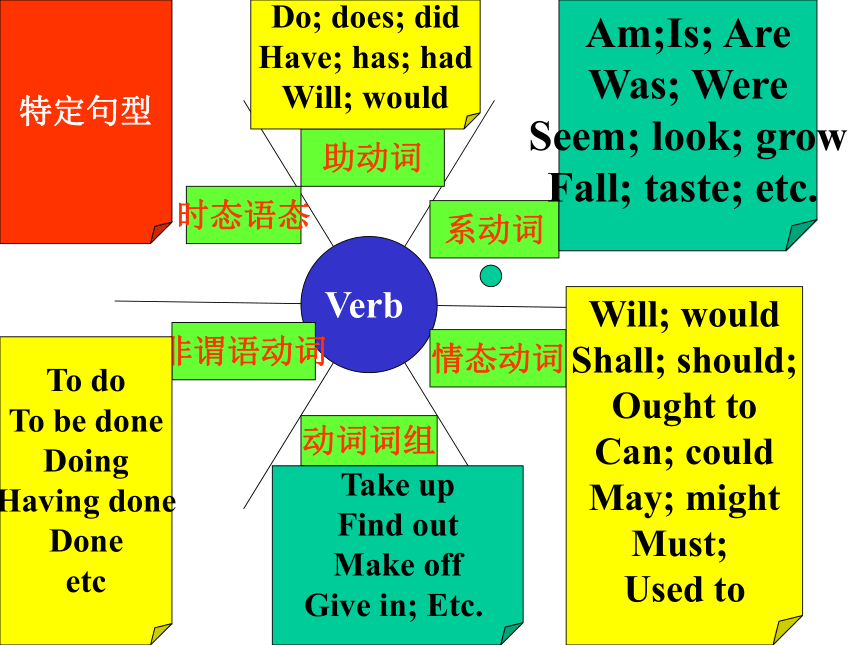 | |
| 格式 | zip | ||
| 文件大小 | 428.3KB | ||
| 资源类型 | 教案 | ||
| 版本资源 | 通用版 | ||
| 科目 | 英语 | ||
| 更新时间 | 2019-05-22 22:28:43 | ||
图片预览


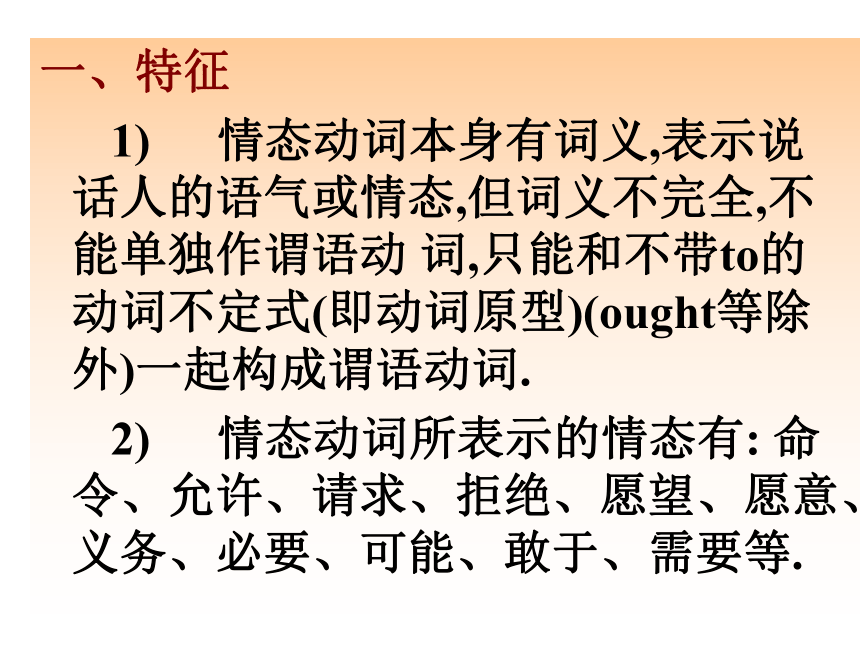
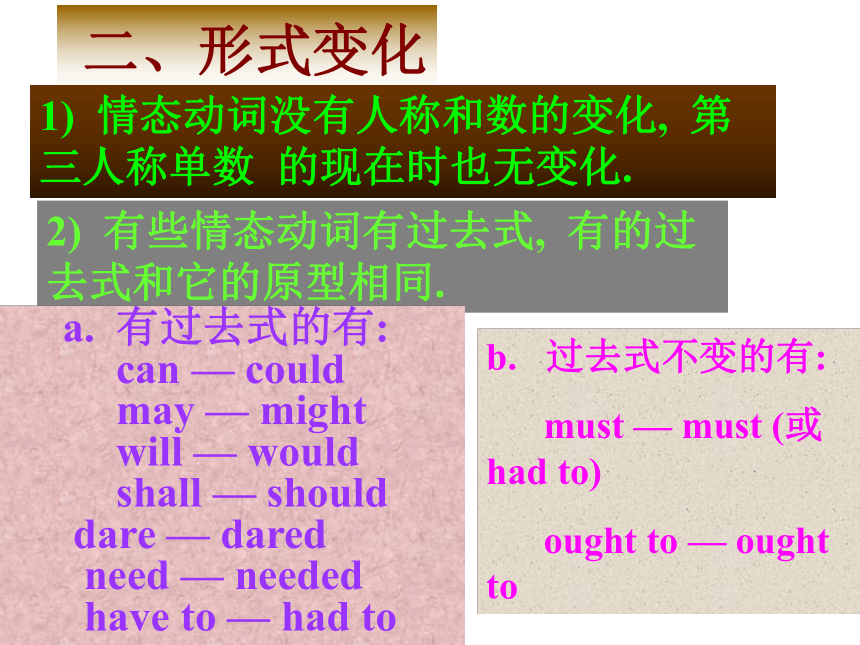
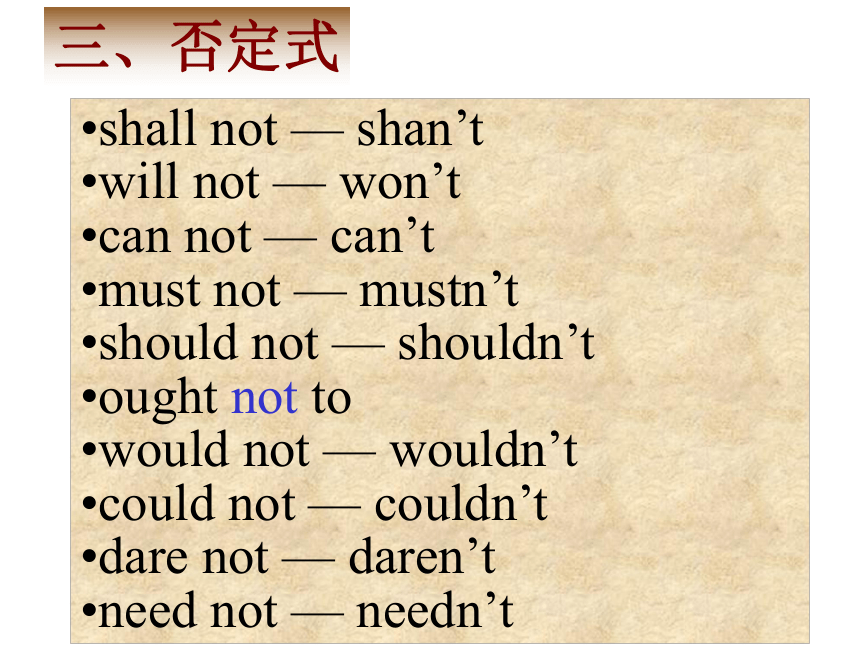
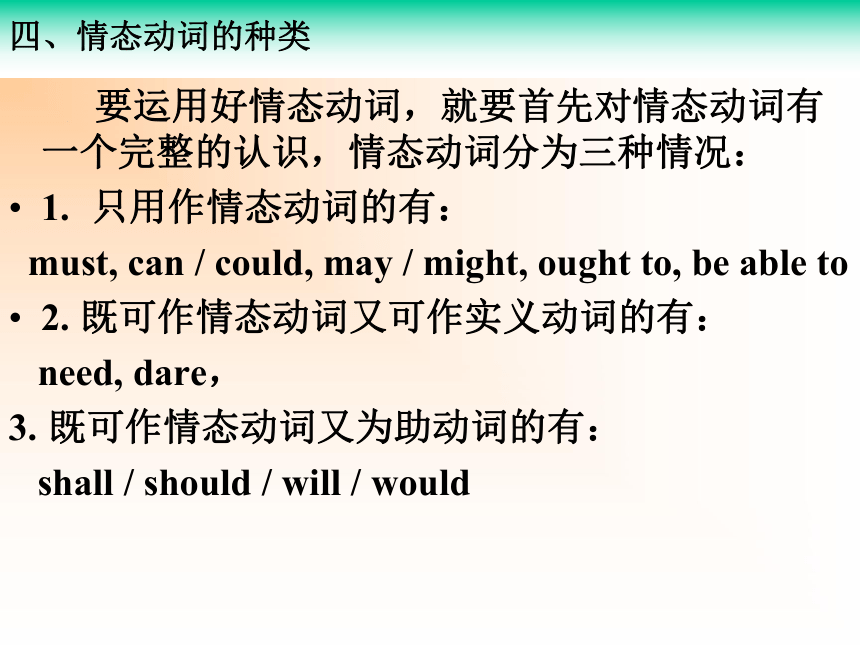
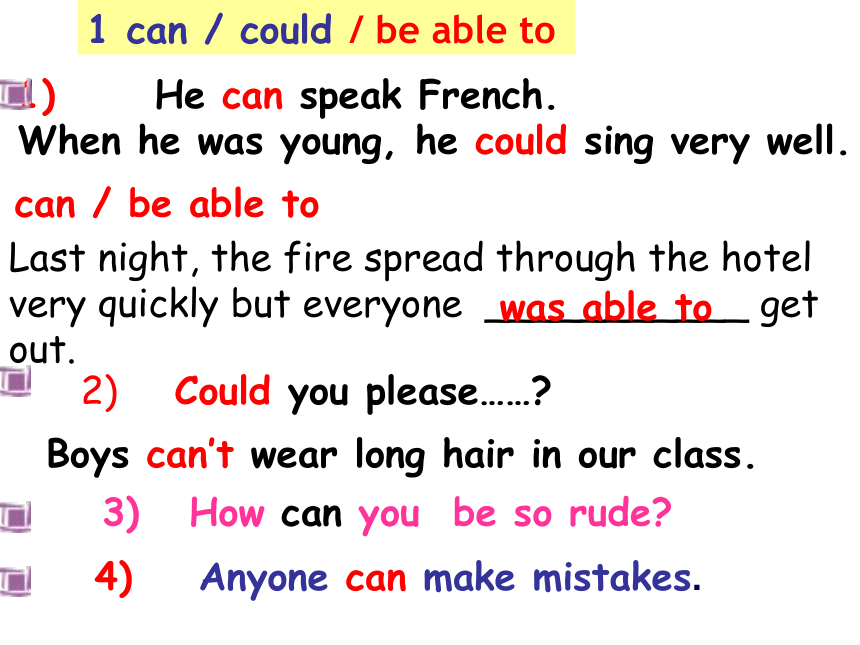
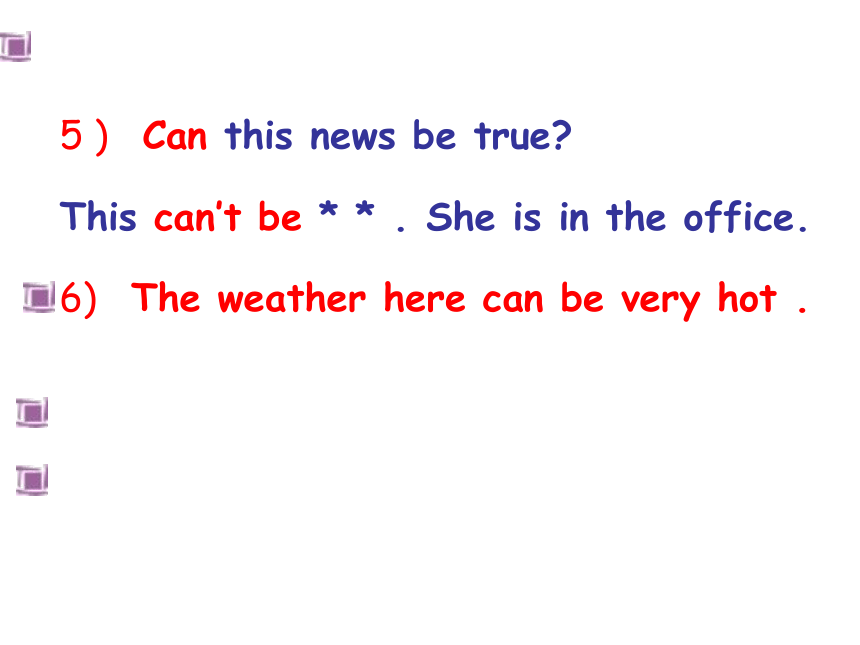


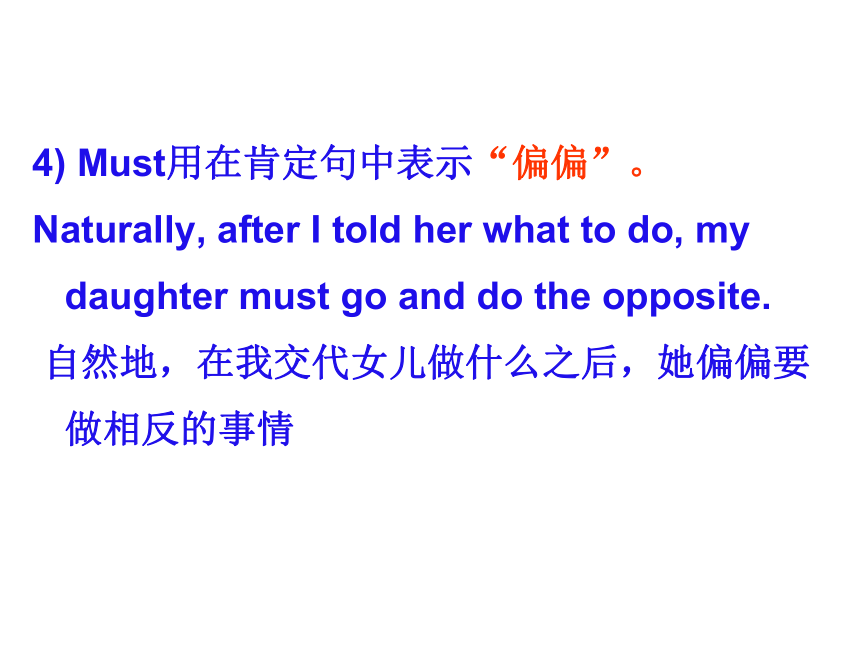
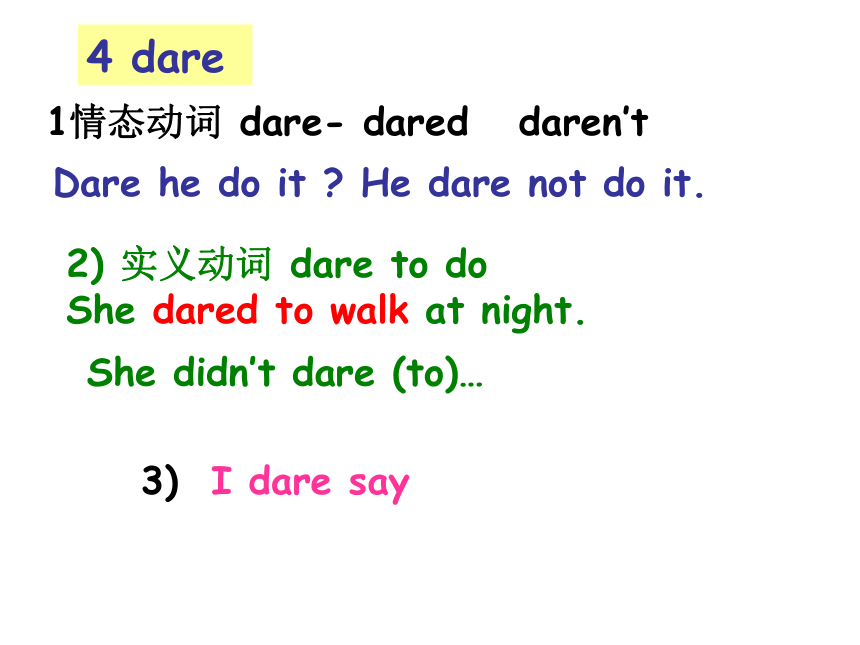
文档简介
课件85张PPT。Verb 助动词系动词情态动词动词词组非谓语动词时态语态Do; does; did
Have; has; had
Will; wouldAm;Is; Are
Was; Were
Seem; look; grow
Fall; taste; etc. Will; would
Shall; should;
Ought to
Can; could
May; might
Must;
Used toTake up
Find out
Make off
Give in; Etc. To do
To be done
Doing
Having done
Done
etc特定句型情态动词一、特征
1)?????情态动词本身有词义,表示说话人的语气或情态,但词义不完全,不能单独作谓语动 词,只能和不带to的动词不定式(即动词原型)(ought等除外)一起构成谓语动词.
2)?????情态动词所表示的情态有: 命令、允许、请求、拒绝、愿望、愿意、义务、必要、可能、敢于、需要等. 二、形式变化1) 情态动词没有人称和数的变化, 第三人称单数 的现在时也无变化.2) 有些情态动词有过去式, 有的过去式和它的原型相同. a. 有过去式的有:
can — could
may — might
will — would
shall — should
dare — dared
need — needed
have to — had tob. 过去式不变的有:
must — must (或had to)
ought to — ought to 三、否定式shall not — shan’t
will not — won’t
can not — can’t
must not — mustn’t
should not — shouldn’t
ought not to
would not — wouldn’t
could not — couldn’t
dare not — daren’t
need not — needn’t四、情态动词的种类 要运用好情态动词,就要首先对情态动词有一个完整的认识,情态动词分为三种情况:
1.??只用作情态动词的有:
must, can / could, may / might, ought to, be able to
2.?既可作情态动词又可作实义动词的有:
need, dare,
3.?既可作情态动词又为助动词的有:
shall / should / will / would1 can / could / be able to 1) He can speak French.
When he was young, he could sing very well.4) Anyone can make mistakes.2) Could you please……?Boys can’t wear long hair in our class.3) How can you be so rude? can / be able to Last night, the fire spread through the hotel very quickly but everyone ___________ get out. was able to 5 ) Can this news be true?This can’t be * * . She is in the office.6) The weather here can be very hot .2 may / might1) ---May I use your pen?
---- yes, you may.
---No, you mustn’t.2) It may/ might rain tomorrow.3) May all your dreams come true.4) may (might) as well do= had better do最好There is nothing to do ,so I may as well go to bed.3 must/ have to 1) We must work hard.We have to be here before 7:30.2) must----mustn’t
---- needn’t-Must I water the flowers?
-yes, you must.
-No, you needn’t/ don’t’ have to.3) must+ v
can’t+ v He must be at the library.
4) Must用在肯定句中表示“偏偏”。
Naturally, after I told her what to do, my daughter must go and do the opposite.
自然地,在我交代女儿做什么之后,她偏偏要做相反的事情 4 dare 1情态动词 dare- dared daren’tDare he do it ? He dare not do it.2) 实义动词 dare to do
She dared to walk at night.3) I dare say She didn’t dare (to)…She is a bit shy and _____ stand up and answer the teacher's questions.
A.dares not B.doesn't dare to
C.dare not to D.dares not to
I wonder how he ___ to his father like that.
A.dared speak B.dare speaking
C.dared to speaking D.dare to speak BA5 need1) You needn’t call him.2) – Need I come?
-- Yes, you must.-- No, you needn’t/don’t have to.3) 实义动词
(sb) need to do
(sth) need to be done/ doingYou _____________ to the meeting tomorrow if you have something important to do.
A. needn’t to come
B. don’t need come
C. don’t need coming
D. needn’t come D6 will / would1) Would you pass me the book?2) I will never do that again.3) This will be the house we are looking for.4) Fish will die out of water.He would get up early when he lived in
the country.7.used to /would1.在表示过去重复的习惯时, used to可用would代替。 would表示过去的习惯性动作时,往往要带有一个特定的时间状语。例如:
Whenever we were in the country, we
_____________play hide-and-seek in the fields.
2.表示过去的状态,只能用 used to,不可用would。例如:
There ____________ be a park. would used to3.used to 强调过去的行为同现在的对比,含有“过去怎样而现在却不这样了”的意思;而would则单纯表示过去的习惯性动作,常和often, every day等连用。例如:
She isn’t what she _____________be.
她跟过去不一样了.
We ____________sit in the yard every evening and listen to his story.
(表示过去的重复行为)used towould
On Sundays he _______go to call on the old man when he was young.
I _______get up late, but now I have got used to getting up very early.
Xiao Li ________be a model worker. He is now a university student.
wouldused toused to--What does the sign over there say? -- No person _____ smoke or carry a lighted cigarette, cigar or pipe in this area.' A、shall??????B、need???? C、will???????D、can
——Can I pay the bill by check?
——Sorry, sir. But it is the management rule of our hotel that payment ____ be made in cash.
A、shall????B、need???????C、will?????D、canAA8. shall / should/ ought to shall 1)What shall we do now?
Shall she come right now?在疑问句中,shall用于1,3 人称,表示
征求对方意见和请求You shall do as I say. ?
Nothing shall stop us from carrying out the plan. ?? He shall have the book when I finish reading.
??You shall fall behind in your exam if you keep playing.??? He shall be punished. (命令)(决心)(允诺)(警告)(威胁)shall表示说话人的意愿,有“命令、允诺、警告、决心,规定,规章”等意思,用于第二、三人称陈述句中。 should 1) They should arrive at 7:30It is nearly 7 o’clock. He should be here
at any moment.2) You won’t believe he should be so rude!
How should I know?惊讶,“竟然会”3) If you should change your mind,
please let me know. ought to They should/ought to arrive at 7:30 ought not to/ oughtn’t to1.--Excuse me, but I want to use your computer to type a report.
--You ____ have my computer if you don’t take care of it.
A. shan’t B. might not C. needn’t D. shouldn’tA2. ---When can I come for the photos ? I need them tomorrow afternoon.
---They _____be ready by 12 : 00 . A. can B. should C. might D. needB3. One ought ____ for what one hasn’t done.
A. not to be punished B. to not be punished
C. To not punished D. not be punishedA“The interest ___be divided into five parts, according to the agreement made by both sides.” declared the judge.
A. may B. should C. must D. shallD 情态动词的考点情态动词的运用是高考英语单项选择几乎每年必考的要点。根据近几年对全国部分高考题的分析,主要归纳为以下几个考查热点:
1.情态动词表示推测;
2.情态动词 + have done 结构;
3.特定的语气;
4.情态动词基本用法.一、can,could,may,might,must 表示判断的用法比较
1. The light is on in the office now, so there _______be someone in it, isn’t there?
2. I’m not sure whether he will come today. He ____________be ill today.
3. Tom has gone to Beijing, so you ______ see him in our school now.mustmay/mightcan’t二.情态动词表示推测的用法情态动词可用来表示推测,语气从强到弱的顺序是: 1.must所表示的可能性最大,最有把握,
意为“一定”。2.can和could主要用于否定句和疑问句中 ,
can’t或couldn’t 表示“不可能”3.may 和 might表示现在或将来可能发生的动作
或情况,主要用于肯定句中,might相对于may
来说,表示的可能性更小一些。must,should,can,may,could,might。表示否定的情态动词的用法: (考点)mustn’t
needn’t
can’t
may not
shouldn’t不准, 禁止没必要 ( = don’t have to )不能; 不可能不可以; 可能不不应该 ( = ought not to )She may not be at home.
She can’t be at home.
They shouldn’t be there right now. 1. You ______ return the book now.
You can keep it till next week if you like.
A. can’t B. mustn’t
C. needn’t D. may not
2. Johnny, you ______ play with the
knife, you ______ hurt yourself.
A. won’t ; can’t B. mustn’t ; may
C. shouldn’t ; must D. can’t ; shouldn’tC B 3. --Will you stay for lunch?
--Sorry, _____. My brother is coming
to see me.
A. I mustn’t B. I can’t
C. I needn’t D. I won’t
4. --May I pick a flower in the garden?
-- ________.
A. No, you needn’t B. Not, please.
C. No, you mustn’t D. No, you won’tB C
At?this?moment,?our?teacher?must?
_____________?(correct)our?exam?papers.情态动词+do
表示对现在或将来的情况的推测情态动词+be doing。
表示对正在进行的情况的推测be?correctingThe?road?is?wet. It ________________ (rain) last night.
There?is?nobody?here.?They?
____________________(go) home.
must/may/might + have done
表示对过去情况推测 (肯定,可能,也许已经…)must have rainedmust?have?all?gone 1.--Are you coming to Jeff’s party? --I’m not sure. I ____go to the concert instead.(NMET2000) A. must B. would C. should D. might 2. Mary __be in Paris,for I saw her in the town only a few minutes ago. A.mustn't B.can't C.shouldn't D.may not BD3.--_____the news be true? —No, it_____be true. A. Can, can’t B. May, can’t C. May, may not D. Must, mustn’t注意:may和might都不用于疑问句中。
(正)Can /Could it be cloudy tomorrow ?
(误)May /Might it be cloudy tomorrow ?AThe children must have watered
the tomatoes yesterday, _______they﹖The minister must have
arrived in Shanghai, _______hehe﹖didn’t hasn’tYou can’t be serious, _____you?
are拓展表示推测——情态动词的重要用法.肯定的推测
可能的推测
否定的推测
疑问的推测must 对将来 对现在 对过去情态动词may, might can’t,
couldn’tcan, could + V. + have done+ V.
+ be doing( not )+ be 1.should/ ought to have done
shouldn’t/ oughtn’t to have done
2. may/might have done
3. could have done
can’t /couldn’t have done
4. needn’t have done
5. must have done
6. Would rather have done情态动词在虚拟语气中的用法 “推测”、“责备”、“怀疑”情态动词+ have done1)must have done
对过去已经发生的事的肯定推测.
(只用于肯定句)He must have gone to bed, for the
light was out.Where is my pen? I must have lost it.2)can/could have done
对过去行为的怀疑和不肯定的推测.
(常用于否定句和疑问句)
在否定句意为“不可能, 不会是”Mick ____________________
(find) his car, for he came to work by bus this morning.
(不可能/不会找到车)can’t/couldn’t have found注意: could+ have done
①表示对过去发生的事的揣测, 可与can互换.
②表示对过去能做的事而没有做, 不可与can替换.
意为:“本来可以做/能做”---I stayed at a hotel while in New
York.
---Oh. Did you? You
________________ (stay )with
Barbara.could have stayedcould+ have done③有时含有责备或
遗憾的意思.You ________________(do)it better.
You ______________ (come) earlier.could have donecould have come3)may/might have done 表示推测,
可能性更小, 主要用于肯定句.
译为: “或许”He __________________(go)to the
library.他或许已经去图书馆了.might +have done 有时含有委婉的
责备或庆幸等感情. 这时不能用mayYou ____________(tell) me earlier.
你本可以早点把消息告诉我的.may/might have gonemight have told4)should have done 表示本应该做
但却未做, 含有“后悔,遗憾,责备,
批评”之意.You should have been more careful.
你本应该更细心些.You shouldn’t have told him about it.
你本不该告诉他这事.5)needn’t have done
表示“本来用不着, 本不必” 之意.You ________________(ask)him.
(But you asked him.)You ________________(come).
I have finished the work.needn’t have askedneedn’t have comeHe was very busy yesterday,otherwise he
_______________ (come) to the party. 6. Would rather have doneI _____________________(do) it
than delayed. I _____________________(go)to the
theatre than stayed home night. would rather have donewould rather have gone比较:would have come拓展宁愿做…Would rather do … (than do …)
Would do …rather than do …
Would rather sb did / had done sth
Prefer to do …(rather than do …)
Prefer doing … to doing …1. The ground is rather wet, so it _______have rained last night, didn’t it?
2. Tom ____have gone to Shanghai, but I’m still not sure about it.
3. The ground is very dry, so it _____have rained last night.
4. Someone must have broken into our bedroom. Who________have done it?
5. I really regretted wasting the hours when I ______have studied hard, but it was too late.mustmaycan’tcouldshould6.Your home is not far from your school, so you _______have left in such a hurry then.
7. I _____________have come to help you with your English, but I was too busy at that time.
8. I’m very sorry for the words I_______ have said to you at that moment.
9. ---I paid a visit to New York last month and we stayed at a nice hotel.
---Oh,you _______have stayed with Barbara.She is always willing to do you a favour.shouldn’t
couldneedn’twould rather情态动词的固定用法 1.cannot…too/enough
无论怎么…也不(过分),越…越好
You cannot be too careful.
You cannot remember enough English words.
2. cannot but+do sth
“不得不,只好”
I cannot but admire your bravery.
I could not but choose to go.3.may well / may well not
may well+do (完全)能 ,很可能
=be very likely to
Her appearance has changed so much
that you may well not recognize her.
她的模样变化太大,你很可能人不出她了。
He may well be proud of his son.
他大可为儿子高兴。May/might as well+ do/have done: 最好,满可以,倒不如 =had better
You may as well stay here over the night.
你最好留在 这里过夜。
You may as well do it at once.
你最好马上做这件事 。
You may as well tell me the truth.
你还是把真相告诉我的好 。The film is boring ,and we might as well not
have come to see it .情态动词巩固练习高考题选1.---I stayed at a hotel while
in New York.
---Oh, did you? You___with
Barbara.
A.could have stayed
B.could stay
C.would stay
D.must have stayedA2.I didn’t see her in the meeting
room this morning. She____
at the meeting
A.mustn’t have spoken
B.shouldn’t have spoken
C.needn’t have spoken
D.couldn’t have spoken
D3.He___you more help, even
though he was busy.
A.might have given
B.must have given
C.can have given
D.may giveA4.---I saw our teacher in the
office just now.
---You___her, she is still
abroad.
A.can’t have seen
B.mustn’t have seen
C.needn’t have seen
D.shouldn’t have seen
A5.Kate is already two hours late.
What____to her?
A.can have happened
B.may have happened
C.should have happened
D.must have happened
A6.We___last night, but we went
to the concert instead.
A.must have studied
B.might study
C.should have studied
D.would studyC7.There was plenty of time.
She___.
A.mustn’t have hurried
B.couldn’t have hurried
C.mustn’t hurry
D.needn’t have hurriedD8.Sorry, I’m late. I_____have
turned off the alarm clock
and gone back to sleep again.
A.might B. should
C.can D.willA9.Yesterday, Jan walked away
from the discussion.Otherwise,
she___something she would
regret later.
A.has said
B.said
C.might say
D.might have saidD10.---Did you scold him for his
mistake?
---Yes, but ____it.
A.I’d rather not do
B.I’d better not do
C.I’d better not have done
D.I’d rather have not done
C11.I didn’t hear the phone.
I___asleep.
A.must be
B.must have been
C.should be
D.should have beenB12.Janny___have kept her
word. I wonder why she
changed her mind.
A.must B.should
C.need D.wouldB
13.Tom ought not to____me
your secret, but he meant
no harm.
A.have told
B.tell
C.be telling
D.having told
A14.----Could I borrow your
dictionary?
----Yes, of course you ____.
A.might B.will
C.can D.shouldC15.----Shall we go skating or
stay at home?
----Which___do yourself ?
A.do you rather
B.would you rather
C.will you rather
D.should you rather
B16.I told Sally how to get here,
but perhaps I____for her.
A.had to write it out
B.ought to write it out
C.must have written it out
D.should have written it out
D17.The fire spread through the
hotel very quickly but
everyone____get out.
A.had to B.would
C.could D.was able to
D18.When he was there, he___go
to that coffee shop at the
corner after work every day.
A.would B.should
C.had better D.mightA19.It is strange that he___such
a silly thing.
A.must have done
B.may have done
C.could have done
D.should have doneD20.-----____he turn up the radio?
-----Yes, please.
A.Will B.Would
C.Does D.Shall
D21.----Jack fell off a ladder
yesterday, but he is all right.
-----He’s lucky. He___himself
badly.
A.could wound
B.would have wounded
C.could hurt
D.would woundB22.----Could I use your
dictionary?
----- ____.
A.Please not
B.Yes, you do
C.No, you might not
D.Please do as yours
D23.----___the young man there
be her cousin?
----He___be, but I’m not sure.
A.Can; may
B.May; won’t
C.Can; must
D.will; don’t
A八、情态动词的否定式比较mustn’t禁止,不准
can’t /couldn’t 不能;不可能;禁止
needn’t 不必
shouldn’t不该
won’t/ wouldn’t 不愿意
daren’t 不敢 ,1. The fire spread through the hotel very quickly, but everyone_______get one.
A. were able to B. would
C. was able to D. could
2. You____return the book now, you can keep it until next week if you like,
A. can’t B. mustn’t
C. needn’t D. may not
3. When he was there, he______ go to that coffee shop at the corner after work every day.
A. would B. should C. had better D. might
4. ---Could I use your bike?—Yes, of course.you___.
A. might B. will C. can D. shouldC CAC5. ----Will you stay for lunch?
----Sorry, _______. My brother is coming to see me.
A. I oughtn’t to B. I can’t
C. I needn’t D. I shouldn’t
6. ----______I invite Jcak to the party?
-----Yes, it’ll be nice if you______.
A. Will; may B. Shall; will
C. Shall;shall D. Will; will
7. ---There were already five people in the car, but they managed to take me as well.
---It______a comfortable journey.
A. can’t be B. shouldn’t be
C. mustn’t have been D. couldn’t have beenBBD8. We______last night, but we went to the concert instead.
A. must have studied B. might study
C. should have studied D. would study
9. There was plenty of time. She_____.
A. mustn’t have hurried B. couldn’t have hurried
C. mustn’t hurry D. needn’t have hurried
10. Yesterday, Jane walked away from the discussion. Otherwise. She____something she would regret later.
A. had said B. said
C. might say D. might have said.
CDD11. ----Did you scold him for his mistake?
----Yes, but______it.
A. I’d rather not do
B. I’d better not do
C. I’d better not have done
D. I’d rather have not doneC一、can/may/must/need 问句的回答方式疑问句式肯定句式否定答式you may.mustn’t/can not.you mustneedn’t/don’t have to.you must.needn’t/
don’t have to.
Have; has; had
Will; wouldAm;Is; Are
Was; Were
Seem; look; grow
Fall; taste; etc. Will; would
Shall; should;
Ought to
Can; could
May; might
Must;
Used toTake up
Find out
Make off
Give in; Etc. To do
To be done
Doing
Having done
Done
etc特定句型情态动词一、特征
1)?????情态动词本身有词义,表示说话人的语气或情态,但词义不完全,不能单独作谓语动 词,只能和不带to的动词不定式(即动词原型)(ought等除外)一起构成谓语动词.
2)?????情态动词所表示的情态有: 命令、允许、请求、拒绝、愿望、愿意、义务、必要、可能、敢于、需要等. 二、形式变化1) 情态动词没有人称和数的变化, 第三人称单数 的现在时也无变化.2) 有些情态动词有过去式, 有的过去式和它的原型相同. a. 有过去式的有:
can — could
may — might
will — would
shall — should
dare — dared
need — needed
have to — had tob. 过去式不变的有:
must — must (或had to)
ought to — ought to 三、否定式shall not — shan’t
will not — won’t
can not — can’t
must not — mustn’t
should not — shouldn’t
ought not to
would not — wouldn’t
could not — couldn’t
dare not — daren’t
need not — needn’t四、情态动词的种类 要运用好情态动词,就要首先对情态动词有一个完整的认识,情态动词分为三种情况:
1.??只用作情态动词的有:
must, can / could, may / might, ought to, be able to
2.?既可作情态动词又可作实义动词的有:
need, dare,
3.?既可作情态动词又为助动词的有:
shall / should / will / would1 can / could / be able to 1) He can speak French.
When he was young, he could sing very well.4) Anyone can make mistakes.2) Could you please……?Boys can’t wear long hair in our class.3) How can you be so rude? can / be able to Last night, the fire spread through the hotel very quickly but everyone ___________ get out. was able to 5 ) Can this news be true?This can’t be * * . She is in the office.6) The weather here can be very hot .2 may / might1) ---May I use your pen?
---- yes, you may.
---No, you mustn’t.2) It may/ might rain tomorrow.3) May all your dreams come true.4) may (might) as well do= had better do最好There is nothing to do ,so I may as well go to bed.3 must/ have to 1) We must work hard.We have to be here before 7:30.2) must----mustn’t
---- needn’t-Must I water the flowers?
-yes, you must.
-No, you needn’t/ don’t’ have to.3) must+ v
can’t+ v He must be at the library.
4) Must用在肯定句中表示“偏偏”。
Naturally, after I told her what to do, my daughter must go and do the opposite.
自然地,在我交代女儿做什么之后,她偏偏要做相反的事情 4 dare 1情态动词 dare- dared daren’tDare he do it ? He dare not do it.2) 实义动词 dare to do
She dared to walk at night.3) I dare say She didn’t dare (to)…She is a bit shy and _____ stand up and answer the teacher's questions.
A.dares not B.doesn't dare to
C.dare not to D.dares not to
I wonder how he ___ to his father like that.
A.dared speak B.dare speaking
C.dared to speaking D.dare to speak BA5 need1) You needn’t call him.2) – Need I come?
-- Yes, you must.-- No, you needn’t/don’t have to.3) 实义动词
(sb) need to do
(sth) need to be done/ doingYou _____________ to the meeting tomorrow if you have something important to do.
A. needn’t to come
B. don’t need come
C. don’t need coming
D. needn’t come D6 will / would1) Would you pass me the book?2) I will never do that again.3) This will be the house we are looking for.4) Fish will die out of water.He would get up early when he lived in
the country.7.used to /would1.在表示过去重复的习惯时, used to可用would代替。 would表示过去的习惯性动作时,往往要带有一个特定的时间状语。例如:
Whenever we were in the country, we
_____________play hide-and-seek in the fields.
2.表示过去的状态,只能用 used to,不可用would。例如:
There ____________ be a park. would used to3.used to 强调过去的行为同现在的对比,含有“过去怎样而现在却不这样了”的意思;而would则单纯表示过去的习惯性动作,常和often, every day等连用。例如:
She isn’t what she _____________be.
她跟过去不一样了.
We ____________sit in the yard every evening and listen to his story.
(表示过去的重复行为)used towould
On Sundays he _______go to call on the old man when he was young.
I _______get up late, but now I have got used to getting up very early.
Xiao Li ________be a model worker. He is now a university student.
wouldused toused to--What does the sign over there say? -- No person _____ smoke or carry a lighted cigarette, cigar or pipe in this area.' A、shall??????B、need???? C、will???????D、can
——Can I pay the bill by check?
——Sorry, sir. But it is the management rule of our hotel that payment ____ be made in cash.
A、shall????B、need???????C、will?????D、canAA8. shall / should/ ought to shall 1)What shall we do now?
Shall she come right now?在疑问句中,shall用于1,3 人称,表示
征求对方意见和请求You shall do as I say. ?
Nothing shall stop us from carrying out the plan. ?? He shall have the book when I finish reading.
??You shall fall behind in your exam if you keep playing.??? He shall be punished. (命令)(决心)(允诺)(警告)(威胁)shall表示说话人的意愿,有“命令、允诺、警告、决心,规定,规章”等意思,用于第二、三人称陈述句中。 should 1) They should arrive at 7:30It is nearly 7 o’clock. He should be here
at any moment.2) You won’t believe he should be so rude!
How should I know?惊讶,“竟然会”3) If you should change your mind,
please let me know. ought to They should/ought to arrive at 7:30 ought not to/ oughtn’t to1.--Excuse me, but I want to use your computer to type a report.
--You ____ have my computer if you don’t take care of it.
A. shan’t B. might not C. needn’t D. shouldn’tA2. ---When can I come for the photos ? I need them tomorrow afternoon.
---They _____be ready by 12 : 00 . A. can B. should C. might D. needB3. One ought ____ for what one hasn’t done.
A. not to be punished B. to not be punished
C. To not punished D. not be punishedA“The interest ___be divided into five parts, according to the agreement made by both sides.” declared the judge.
A. may B. should C. must D. shallD 情态动词的考点情态动词的运用是高考英语单项选择几乎每年必考的要点。根据近几年对全国部分高考题的分析,主要归纳为以下几个考查热点:
1.情态动词表示推测;
2.情态动词 + have done 结构;
3.特定的语气;
4.情态动词基本用法.一、can,could,may,might,must 表示判断的用法比较
1. The light is on in the office now, so there _______be someone in it, isn’t there?
2. I’m not sure whether he will come today. He ____________be ill today.
3. Tom has gone to Beijing, so you ______ see him in our school now.mustmay/mightcan’t二.情态动词表示推测的用法情态动词可用来表示推测,语气从强到弱的顺序是: 1.must所表示的可能性最大,最有把握,
意为“一定”。2.can和could主要用于否定句和疑问句中 ,
can’t或couldn’t 表示“不可能”3.may 和 might表示现在或将来可能发生的动作
或情况,主要用于肯定句中,might相对于may
来说,表示的可能性更小一些。must,should,can,may,could,might。表示否定的情态动词的用法: (考点)mustn’t
needn’t
can’t
may not
shouldn’t不准, 禁止没必要 ( = don’t have to )不能; 不可能不可以; 可能不不应该 ( = ought not to )She may not be at home.
She can’t be at home.
They shouldn’t be there right now. 1. You ______ return the book now.
You can keep it till next week if you like.
A. can’t B. mustn’t
C. needn’t D. may not
2. Johnny, you ______ play with the
knife, you ______ hurt yourself.
A. won’t ; can’t B. mustn’t ; may
C. shouldn’t ; must D. can’t ; shouldn’tC B 3. --Will you stay for lunch?
--Sorry, _____. My brother is coming
to see me.
A. I mustn’t B. I can’t
C. I needn’t D. I won’t
4. --May I pick a flower in the garden?
-- ________.
A. No, you needn’t B. Not, please.
C. No, you mustn’t D. No, you won’tB C
At?this?moment,?our?teacher?must?
_____________?(correct)our?exam?papers.情态动词+do
表示对现在或将来的情况的推测情态动词+be doing。
表示对正在进行的情况的推测be?correctingThe?road?is?wet. It ________________ (rain) last night.
There?is?nobody?here.?They?
____________________(go) home.
must/may/might + have done
表示对过去情况推测 (肯定,可能,也许已经…)must have rainedmust?have?all?gone 1.--Are you coming to Jeff’s party? --I’m not sure. I ____go to the concert instead.(NMET2000) A. must B. would C. should D. might 2. Mary __be in Paris,for I saw her in the town only a few minutes ago. A.mustn't B.can't C.shouldn't D.may not BD3.--_____the news be true? —No, it_____be true. A. Can, can’t B. May, can’t C. May, may not D. Must, mustn’t注意:may和might都不用于疑问句中。
(正)Can /Could it be cloudy tomorrow ?
(误)May /Might it be cloudy tomorrow ?AThe children must have watered
the tomatoes yesterday, _______they﹖The minister must have
arrived in Shanghai, _______hehe﹖didn’t hasn’tYou can’t be serious, _____you?
are拓展表示推测——情态动词的重要用法.肯定的推测
可能的推测
否定的推测
疑问的推测must 对将来 对现在 对过去情态动词may, might can’t,
couldn’tcan, could + V. + have done+ V.
+ be doing( not )+ be 1.should/ ought to have done
shouldn’t/ oughtn’t to have done
2. may/might have done
3. could have done
can’t /couldn’t have done
4. needn’t have done
5. must have done
6. Would rather have done情态动词在虚拟语气中的用法 “推测”、“责备”、“怀疑”情态动词+ have done1)must have done
对过去已经发生的事的肯定推测.
(只用于肯定句)He must have gone to bed, for the
light was out.Where is my pen? I must have lost it.2)can/could have done
对过去行为的怀疑和不肯定的推测.
(常用于否定句和疑问句)
在否定句意为“不可能, 不会是”Mick ____________________
(find) his car, for he came to work by bus this morning.
(不可能/不会找到车)can’t/couldn’t have found注意: could+ have done
①表示对过去发生的事的揣测, 可与can互换.
②表示对过去能做的事而没有做, 不可与can替换.
意为:“本来可以做/能做”---I stayed at a hotel while in New
York.
---Oh. Did you? You
________________ (stay )with
Barbara.could have stayedcould+ have done③有时含有责备或
遗憾的意思.You ________________(do)it better.
You ______________ (come) earlier.could have donecould have come3)may/might have done 表示推测,
可能性更小, 主要用于肯定句.
译为: “或许”He __________________(go)to the
library.他或许已经去图书馆了.might +have done 有时含有委婉的
责备或庆幸等感情. 这时不能用mayYou ____________(tell) me earlier.
你本可以早点把消息告诉我的.may/might have gonemight have told4)should have done 表示本应该做
但却未做, 含有“后悔,遗憾,责备,
批评”之意.You should have been more careful.
你本应该更细心些.You shouldn’t have told him about it.
你本不该告诉他这事.5)needn’t have done
表示“本来用不着, 本不必” 之意.You ________________(ask)him.
(But you asked him.)You ________________(come).
I have finished the work.needn’t have askedneedn’t have comeHe was very busy yesterday,otherwise he
_______________ (come) to the party. 6. Would rather have doneI _____________________(do) it
than delayed. I _____________________(go)to the
theatre than stayed home night. would rather have donewould rather have gone比较:would have come拓展宁愿做…Would rather do … (than do …)
Would do …rather than do …
Would rather sb did / had done sth
Prefer to do …(rather than do …)
Prefer doing … to doing …1. The ground is rather wet, so it _______have rained last night, didn’t it?
2. Tom ____have gone to Shanghai, but I’m still not sure about it.
3. The ground is very dry, so it _____have rained last night.
4. Someone must have broken into our bedroom. Who________have done it?
5. I really regretted wasting the hours when I ______have studied hard, but it was too late.mustmaycan’tcouldshould6.Your home is not far from your school, so you _______have left in such a hurry then.
7. I _____________have come to help you with your English, but I was too busy at that time.
8. I’m very sorry for the words I_______ have said to you at that moment.
9. ---I paid a visit to New York last month and we stayed at a nice hotel.
---Oh,you _______have stayed with Barbara.She is always willing to do you a favour.shouldn’t
couldneedn’twould rather情态动词的固定用法 1.cannot…too/enough
无论怎么…也不(过分),越…越好
You cannot be too careful.
You cannot remember enough English words.
2. cannot but+do sth
“不得不,只好”
I cannot but admire your bravery.
I could not but choose to go.3.may well / may well not
may well+do (完全)能 ,很可能
=be very likely to
Her appearance has changed so much
that you may well not recognize her.
她的模样变化太大,你很可能人不出她了。
He may well be proud of his son.
他大可为儿子高兴。May/might as well+ do/have done: 最好,满可以,倒不如 =had better
You may as well stay here over the night.
你最好留在 这里过夜。
You may as well do it at once.
你最好马上做这件事 。
You may as well tell me the truth.
你还是把真相告诉我的好 。The film is boring ,and we might as well not
have come to see it .情态动词巩固练习高考题选1.---I stayed at a hotel while
in New York.
---Oh, did you? You___with
Barbara.
A.could have stayed
B.could stay
C.would stay
D.must have stayedA2.I didn’t see her in the meeting
room this morning. She____
at the meeting
A.mustn’t have spoken
B.shouldn’t have spoken
C.needn’t have spoken
D.couldn’t have spoken
D3.He___you more help, even
though he was busy.
A.might have given
B.must have given
C.can have given
D.may giveA4.---I saw our teacher in the
office just now.
---You___her, she is still
abroad.
A.can’t have seen
B.mustn’t have seen
C.needn’t have seen
D.shouldn’t have seen
A5.Kate is already two hours late.
What____to her?
A.can have happened
B.may have happened
C.should have happened
D.must have happened
A6.We___last night, but we went
to the concert instead.
A.must have studied
B.might study
C.should have studied
D.would studyC7.There was plenty of time.
She___.
A.mustn’t have hurried
B.couldn’t have hurried
C.mustn’t hurry
D.needn’t have hurriedD8.Sorry, I’m late. I_____have
turned off the alarm clock
and gone back to sleep again.
A.might B. should
C.can D.willA9.Yesterday, Jan walked away
from the discussion.Otherwise,
she___something she would
regret later.
A.has said
B.said
C.might say
D.might have saidD10.---Did you scold him for his
mistake?
---Yes, but ____it.
A.I’d rather not do
B.I’d better not do
C.I’d better not have done
D.I’d rather have not done
C11.I didn’t hear the phone.
I___asleep.
A.must be
B.must have been
C.should be
D.should have beenB12.Janny___have kept her
word. I wonder why she
changed her mind.
A.must B.should
C.need D.wouldB
13.Tom ought not to____me
your secret, but he meant
no harm.
A.have told
B.tell
C.be telling
D.having told
A14.----Could I borrow your
dictionary?
----Yes, of course you ____.
A.might B.will
C.can D.shouldC15.----Shall we go skating or
stay at home?
----Which___do yourself ?
A.do you rather
B.would you rather
C.will you rather
D.should you rather
B16.I told Sally how to get here,
but perhaps I____for her.
A.had to write it out
B.ought to write it out
C.must have written it out
D.should have written it out
D17.The fire spread through the
hotel very quickly but
everyone____get out.
A.had to B.would
C.could D.was able to
D18.When he was there, he___go
to that coffee shop at the
corner after work every day.
A.would B.should
C.had better D.mightA19.It is strange that he___such
a silly thing.
A.must have done
B.may have done
C.could have done
D.should have doneD20.-----____he turn up the radio?
-----Yes, please.
A.Will B.Would
C.Does D.Shall
D21.----Jack fell off a ladder
yesterday, but he is all right.
-----He’s lucky. He___himself
badly.
A.could wound
B.would have wounded
C.could hurt
D.would woundB22.----Could I use your
dictionary?
----- ____.
A.Please not
B.Yes, you do
C.No, you might not
D.Please do as yours
D23.----___the young man there
be her cousin?
----He___be, but I’m not sure.
A.Can; may
B.May; won’t
C.Can; must
D.will; don’t
A八、情态动词的否定式比较mustn’t禁止,不准
can’t /couldn’t 不能;不可能;禁止
needn’t 不必
shouldn’t不该
won’t/ wouldn’t 不愿意
daren’t 不敢 ,1. The fire spread through the hotel very quickly, but everyone_______get one.
A. were able to B. would
C. was able to D. could
2. You____return the book now, you can keep it until next week if you like,
A. can’t B. mustn’t
C. needn’t D. may not
3. When he was there, he______ go to that coffee shop at the corner after work every day.
A. would B. should C. had better D. might
4. ---Could I use your bike?—Yes, of course.you___.
A. might B. will C. can D. shouldC CAC5. ----Will you stay for lunch?
----Sorry, _______. My brother is coming to see me.
A. I oughtn’t to B. I can’t
C. I needn’t D. I shouldn’t
6. ----______I invite Jcak to the party?
-----Yes, it’ll be nice if you______.
A. Will; may B. Shall; will
C. Shall;shall D. Will; will
7. ---There were already five people in the car, but they managed to take me as well.
---It______a comfortable journey.
A. can’t be B. shouldn’t be
C. mustn’t have been D. couldn’t have beenBBD8. We______last night, but we went to the concert instead.
A. must have studied B. might study
C. should have studied D. would study
9. There was plenty of time. She_____.
A. mustn’t have hurried B. couldn’t have hurried
C. mustn’t hurry D. needn’t have hurried
10. Yesterday, Jane walked away from the discussion. Otherwise. She____something she would regret later.
A. had said B. said
C. might say D. might have said.
CDD11. ----Did you scold him for his mistake?
----Yes, but______it.
A. I’d rather not do
B. I’d better not do
C. I’d better not have done
D. I’d rather have not doneC一、can/may/must/need 问句的回答方式疑问句式肯定句式否定答式you may.mustn’t/can not.you mustneedn’t/don’t have to.you must.needn’t/
don’t have to.
